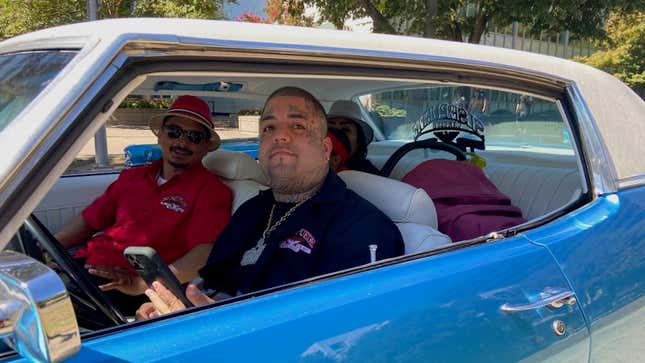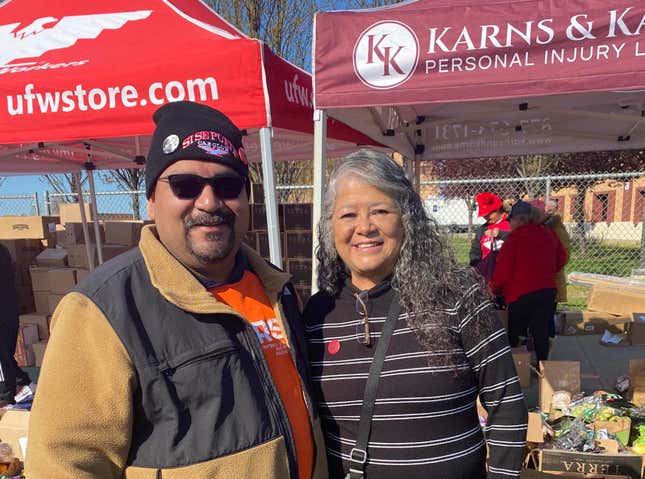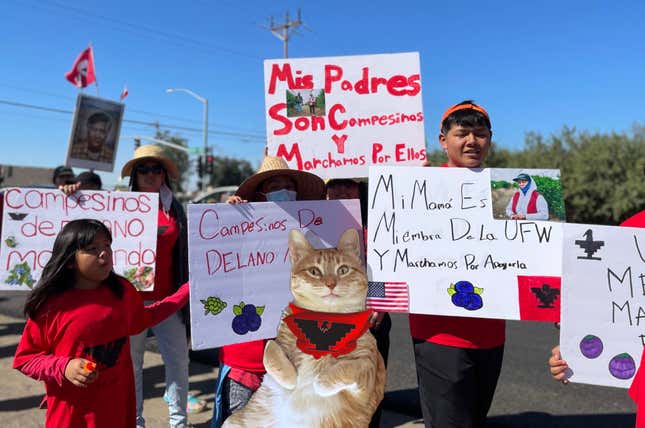
Here’s something that you, an automotive enthusiast, might not know: Lowriders are the best kind of car culture. No, seriously. Nothing else comes close (except maybe Dekotora trucks) to the level of artistry, attention to detail, cultural relevance and overall passion that the lowrider community shows. It’s incredible. What’s even more remarkable is when a club of lowrider enthusiasts takes all that passion and puts it towards an incredibly worthy cause.
In case you missed it:
- These Are Your Favorite Old Top Gear Segments
- The Largest Automotive Recalls in History (So Far)
- Formula 1's Race Strategy in America Isn’t Convincing Fans to Stick Around
Si Se Puede is generally translated to English as “Yes, it can be done!” and it’s the rallying cry of the United Farm Workers (aka UFW, you know, the one made famous by Cesar Chavez and Dolores Huerta) which has supported farmworkers’ rights for decades and which still struggles against incredibly harmful legislation, lack of awareness from the general public as well as hostility from growers all over the country. The car club that takes its name from this slogan has its roots in the communities most affected by the UFW’s work, and that’s part of what has inspired its founder and president, Andrew Rodriguez Sr., to give back.

44-year-old Andrew Rodriguez Sr. founded the Si Se Puede Car Club in 2011 in his hometown of Corcoran, California – a town best known for the presence of a maximum security prison – as a way to get his friends and family who were already a part of the lowrider community together. The club started with five members and has since expanded to around 27, with additional chapters in Delano, Hanford, Visalia, Cutler, Fresno, Merced and Antioch.
I first became aware of the Si Se Puede club back in the summer of 2022 when members assisted UFW members on their historic walk from Delano to Sacramento in support of California Agriculture Labor Relations Voting Choice Act Assembly Bill (AB) 2183, which at the time California governor Gavin Newsom – himself a vineyard owner – was unwilling to sign, despite President Biden urging him to do so.

Friend of Jalopnik (and to the workers of the world in general), Jorts the Cat, had shared with me the 355-mile march and the work that Andrew and his club were doing to support it by providing water, food and even footwear to the marchers as they slowly made their way to the capital in the scorching summer heat.
Fast forward to early 2023, when record rainfall in California led to unprecedented flooding in communities throughout the central valley, including in Corcoran, which saw a return of the long-dried Tulare Lake. Again the UFW was out helping people in these low-income, primarily agricultural communities, and the Si Se Puede car club was, in turn, helping the UFW by providing food and other household goods to people who had lost their homes or work due to rivers overrunning their banks.
During a phone call with Andrew, I asked what drove him and his friends to go out of their way to help people they didn’t even know. Why was this work so important to him that he named the car club after it?
“So they know they’re not alone,” Rodriguez Sr. said. “It’s only right.”
Andrew Rodriguez Sr. discovered his love of cars in general and lowriders in particular through the pages of now sadly out-of-print Lowrider Magazine and his dad’s work on cars. This passion stayed with him until he was able to purchase his first lowrider, a 1980 Pontiac Grand Prix, which was his real introduction to the friendship and brotherhood that his local lowrider community offered.
Rodriguez Sr. put countless hours and all his spare money into that car, which was his pride and joy until he had his first kid in high school and was forced to drop out to support his new family through agricultural work in cotton and later as an irrigation technician. Eventually, he worked his way into better-paying and more stable jobs and bought a 1962 Chevy Impala, a car he’s still building as a tribute to his mom, whom he lost to COVID-19. Through all of this, he has found time to go back to school and is on track to get his GED this year, something of which he’s rightfully extremely proud.
To get the perspective of the UFW, I spoke to the Director of Strategic Campaigns for the union, Elizabeth Strater.
“They just waded in and got to work and stayed in touch with the organizers,” said Strater. “During the march, they would go ahead of the marchers, set up and be ready so that when the demonstrators got there, they could give them food and water. Seeing these huge, tough-looking super tattooed guys spraying sunscreen on people and offering them bottles of water was amazing.”
After the 2022 march, the lowrider club didn’t stop because it was still another month until Governor Newsom signed AB 2183, and in the interim, the UFW held a vigil. Si Se Puede provided aid there too.
“Whether it’s a lowrider car club or an internet cat, solidarity can come from unexpected places,” continued Strater. “Sometimes in labor, we can get so focused that we forget about the big tent mentality, where everyone who wants to help should be welcome. This has been a great reminder of that.”
According to Elizabeth, the average age of the UFW members skews older, but she believes that could change through the increased visibility that the UFW has been getting from people like John Oliver, Jorts the Cat and other people on social media platforms like TikTok.
“Young people are realizing that they’re working longer hours than ever but struggling to afford to rent an apartment in the city in which they live, or even in some cases to feed themselves properly, and this is making them angry.”
That anger is finding a home in the newly revitalized American labor movement, which has been seeing a bit of a boom in recent years due to several factors but none more pertinent than rampant income inequality. These young workers are angry, but Strater believes they’re also optimistic.
“We have to find a way to channel that angry optimism.”
And solidarity can come from anywhere. Take it from an outsider’s perspective or more specifically internet labor feline Jorts the Cat:
“Well, I guess it’s like a cat talking to Jalopnik reporters about farm workers. Solidarity works when people from different groups all come together for a common goal. Like, when the farm workers spoke out in support of IATSE (International Alliance of Theatrical Stage Employees, Moving Picture Technicians, Artists and Allied Crafts of the United States, Its Territories and Canada) film workers because they know what it’s like not to get enough rest.”
Jorts continues, “It makes total sense to me that California car clubs have rolled out in support of farm workers. They’re a strong, friendly and highly organized group of folks who know how to get information out and are good at the logistical parts of holding an event. They’re also a group that isn’t always viewed in the best light by the structures of power and still found ways to thrive as a community.”
If the efforts of people like Strater and Andrew Rodriguez Sr and even Jorts the Cat are any indication, that channeling is working.